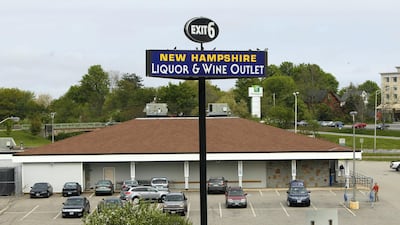Prohibition in the US may have ended in December 1933, but the bootleggers are back.
In the 1920s, illicit alcohol was smuggled into the US from Canada. Now the source is New Hampshire, where prices in state-run liquor stores are considerably lower than in neighbouring states.
Many of the liquor stores are close to the state line and they offer rich pickings to modern-day smugglers who are buying vast quantities of alcohol and selling it on at a considerable profit on the black market.
Alcohol is big business in New Hampshire where the state has a monopoly on hard liquor sales and also accounts for 70 per cent of the wine market.
Being able to buy in bulk gives the state purchasing power which enables it to undercut its neighbours. Not levying sales tax makes alcohol even more competitive.
According to the latest figures, New Hampshire raises $700 million a year in sales from its 79 liquor stores, with $160 million going to the state treasury.
__________
Read more:
Lebanon's largest drug bust lines entire football field
What is it about Vimto that makes it such a Ramadan staple?
Medical opinion shifts from tolerating e-cigs to actively promoting them to smokers
__________
Smugglers pay in cash in transactions that are usually just below the $10,000 threshold which triggers a reporting requirement to the authorities.
The chance of making a healthy profit by transporting liquor in bulk was, prosecutors say, too irresistible for 45-year-old Juncheng Chen to resist.
Chen, from Queen’s, New York was picked up with 757 litres of alcohol in his car last December.
His Chevrolet Suburban was packed with more than 500 bottles of Hennessy cognac, Beefeater’s gin, Bailey’s Irish Cream and an array of other drinks.
Chen had visited five different New Hampshire liquor outlets, unaware that he was being trailed by an investigator from the New York State Department of Taxation.
He was pulled over just as he crossed back into New York and charged with tax evasion.
According to Nonie Manion, New York’s acting Tax Commissioner, Chen had evaded nearly $1,300 in duty. His lawyer, however, insisted that the liquor was bought for personal use for parties at home and elsewhere.
New York’s tax authorities enlisted the cooperation of Vermont, which lies between New Hampshire and New York and regards bootlegging as “organised criminal activity”.
The Internal Revenue Service, responsible for collecting federal tax, has also been watching the trade closely.
Vermont has started picking up bootleggers as they pass through the state.
“People are breaking both state law and federal law,” said Gary Kessler, deputy commissioner at the Vermont Department of Liquor Control. “The frequency with which we catch people, without very much effort, shows this is going on much more than we think.
“You will have people spending thousands of dollars in cash in one store and then moving onto another. You have to ask where this money is coming from.
“When we have caught people, they have had a vast amount of alcohol, a shopping list, cash bundled up and where the liquor is going to.
“We think a lot is going to Chinese restaurants in New York City.”
Legislators in Vermont have been asked to increase the penalties, which were set back in the 1930s, but the bill was not taken up and the maximum fine remains only $1,000.
Massachusetts started taxing alcohol in 2009, a move which triggered a billboard blitz encouraging people to cross the border and buy their beverages in New Hampshire.
In theory, carrying any alcohol across the state line is illegal and has been since the end of prohibition, but little attempt has been made to enforce the law.
Andru Volinsky, a member of the New Hampshire’s Executive Council, has raised his concerns about the impact the bootlegging is having on the state.
“There are two areas of concern,” he said. “A great deal of cash is being handled in stores and carried to banks without security.
“On a day when I was there, I witnessed $70,000 being taken to a bank and I am concerned about the safety of the staff.
“The other areas of concern is that the cash transactions are being structured to avoid reporting requirements.
“They are being kept below the $10,000 threshold which in itself is an offence known as structuring.
“These restrictions were brought in to deal with money laundering, drug trafficking and human trafficking and we are failing in our obligation to report these transactions.”
New Hampshire’s Liquor Commission defended its handling of the trade.
“The New Hampshire Liquor Commission is committed to following state and federal laws and we have an 85-year track record of doing just that,” a spokesman said.
“There’s nothing illegal or unscrupulous about making large sales to out of state customers as long as our employees follow our comprehensive training and the policies in place set forth by the state and federal government.
“Our employees will not be put in the position of questioning each out of state customer to determine what they will do with their purchased product.
“It is the individual customer's responsibility to comply with their local laws if they bring that alcohol home with them.”

